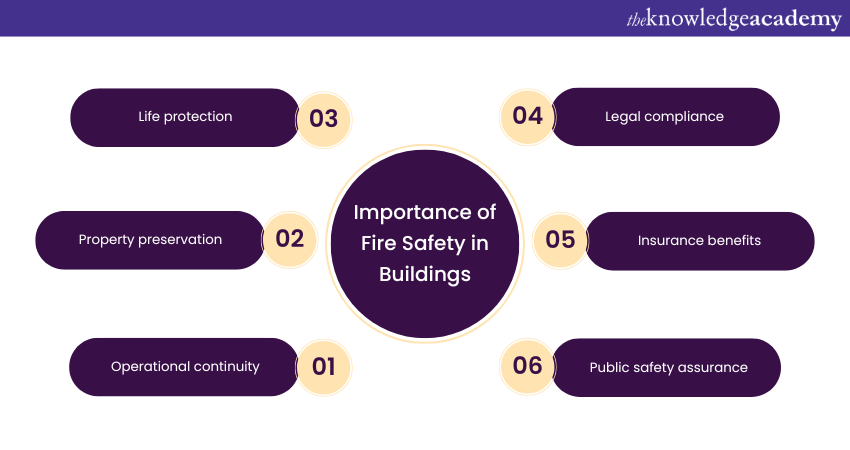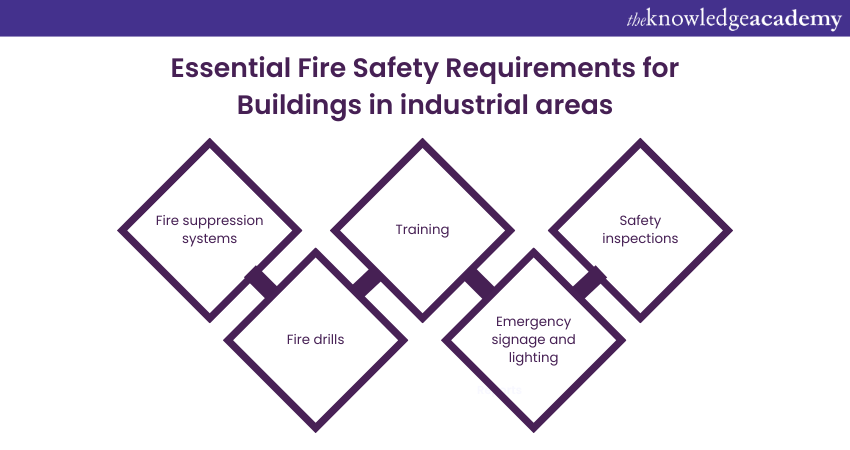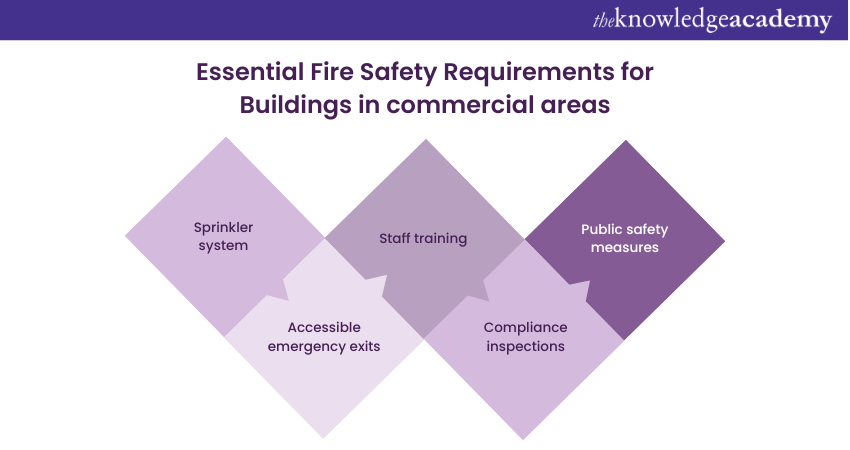We may not have the course you’re looking for. If you enquire or give us a call on 01344203999 and speak to our training experts, we may still be able to help with your training requirements.
Training Outcomes Within Your Budget!
We ensure quality, budget-alignment, and timely delivery by our expert instructors.

Understanding Fire Safety Requirements for Buildings is essential in the planning and management of any structure. These requirements cover a range of measures designed to minimise the risk of fire, providing a crucial first line of defence in protecting lives and property. These measures are universally applicable with the primary objective of preventing potential disasters and ensuring the safety of occupants.
According to Statista, the market for fire suppression equipment is projected to grow to nearly 19.53 billion GBP by 2024. This shows the critical importance of adhering to Fire Safety Regulations. If you're interested in learning about the precautions you can take to enhance safety in your environment, this blog is your go-to resource. We will cover the Fire Safety Requirements for Buildings, explore the key Fire Safety Rules and Regulations and how these measures provide protection when it matters most.
Table of Contents
1) What is Fire Safety?
2) Importance of Fire Safety in Buildings
3) Essential Fire Safety Requirements for Buildings in residential areas
4) Essential Fire Safety Requirements for Buildings in industrial areas
5) Essential Fire Safety Requirements for Buildings in commercial areas
6) Fire Safety Regulations for Buildings
7) Conclusion
What is Fire Safety?
Fire Safety is a set of practices that aim to minimise the damage caused by fire. This include strategies to prevent fire ignition or spread and reduce the extent of the development and effects of a fire after it starts. These steps may involve creating safe buildings by choosing fire-resistant materials in their construction, fitting them with fire detectors and extinguishers, and properly maintaining these systems and equipment. It also includes training the occupants and personnel in fire prevention strategies and what actions to take in the event of a fire.
Importance of Fire Safety in Buildings
The importance of Fire Safety in Buildings can be outlined through several key points:

Image description: Explaining the importance of Fire Safety in Buildings
a) Life protection: Implementing robust fire safety measures is crucial for protecting the lives of all building occupants. These measures help prevent potential fire incidents and ensure that effective and efficient response strategies are in place, which is essential for safe evacuations during emergencies.
b) Property preservation: Fire safety protocols are key to minimising damage to buildings' structures and contents in the event of a fire. This not only helps safeguard property investments but also preserves historical and cultural assets that might be irreplaceable.
c) Operational continuity: Effective fire safety measures enable businesses and services housed within buildings to recover and resume operations quickly after a fire incident. This continuity is vital for minimising economic losses and maintaining service delivery, which can be especially critical in sectors like healthcare and education.
d) Legal compliance: Adherence to Fire Safety Regulations is mandatory for building owners and managers. By adhering to these laws, they not only avoid potential fines and legal actions but also contribute to setting industry standards for safety, which can improve overall community trust and business reputation.
e) Insurance benefits: Buildings with Fire Safety Systems qualify for lower insurance premiums because they are deemed to be at a lower risk. This can represent significant cost savings for building owners over time, making investment in Fire Safety systems financially beneficial as well.
f) Public safety assurance: Ensuring fire safety in public and commercial buildings is essential for protecting the public. This is particularly important in buildings that accommodate large groups of people, such as schools, malls, and theatres.
Learn to prevent potential fire hazards with our Fire Risk Assessment Training today!
Essential Fire Safety Requirements for Buildings in residential areas
It is important to focus on Fire Safety in residential areas to save lives and guard property. The use of effective Fire Safety measures by residents ensures that they feel secure at home while being ready for any emergency. Here are some key fir safety requirements:
a) Smoke detectors: Place smoke detectors in all rooms and common areas so that residents can be notified of smoke as soon as possible, thus saving lives through early warning.
b) Multiple exits: Create more than one exit path that is easily accessible and unblocked at all times to allow a fast and easy evacuation process in case of an emergency.
c) Fire extinguishers: Install fire extinguishers on every floor and ensure that they are visible and can be accessed easily in case of a fire. This will help suppress any fire at an early stage before it can grow.
d) Maintenance checks: Inspect all safety equipment, like smoke detectors, fire extinguishers, and fire suppression systems, on a regular basis. This helps to prevent them from breaking down and being inoperable during an emergency.
e) Fire escape plans: Make the plans crystal clear and visibly visible in common areas to educate everybody about what to do in case of a fire.
Prevent Workplace Hazards: Master Line of Fire Safety Today!
Essential Fire Safety Requirements for Buildings in industrial areas
In industrial settings, where the risk of fire is likely to be high due to the presence of flammable materials and heavy machinery, thorough Fire Safety measures are important. Some of the requirements are mentioned below:

a) Fire suppression systems: Introduce high-performance fire suppression systems designed to deal with the dangers in industrial areas, such as chemicals or combustible materials.
b) Fire drills: Regular fire drills are needed to make sure every employee knows emergency procedures and evacuation routes. This helps reduce panic and confusion during real crises.
c) Training: Provide employees with comprehensive Fire Safety training to acknowledge them with the application of fire extinguishers, recognition of fire threats, and emergency communication procedures.
d) Emergency signage and lighting: Place suitable emergency exit signages and lighting to direct employees to safety during an evacuation, especially in cases of power failure.
e) Safety inspections: Check that relevant authorities conduct regular safety inspections to enforce standards and spot any Fire Safety matters that can cause a disaster before they occur.
Protect What Matters: Learn Fire Safety Precautions Today.
Essential Fire Safety Requirements for Buildings in commercial areas
Commercial buildings, visited regularly by the public and housing various business operations, require robust Fire Safety strategies to confirm the well-being of all occupants. Effective Fire Safety measures are vital to providing a safe environment for customers and employees. Let's explore some of them:

a) Sprinkler system: Maintain a fully functional automatic sprinkler system throughout the building. This is one of the major fire suppression tools that can reduce fire damage and increase safety.
b) Accessible emergency exits: All emergency exits should be clearly marked and unobstructed to provide a safe and quick escape route for everyone in the building during a fire.
c) Staff training: Conduct at least once a month Fire Safety training for all personnel of your organisation on how to use extinguishers, identify fire hazards and make evacuation as simple as possible.
d) Compliance inspections: Schedule Fire Safety officials to conduct regular inspections of the building to ensure adherence to the local fire code and Regulations and address any issues immediately.
e) Public safety measures: Implement public safety measures by clearly displaying evacuation plans and emergency procedures in easily visible areas. This will enable customers and visitors to be guided smoothly and safely, ensuring safety and compliance with evacuation processes.
Stay Prepared! Use Our Fire Safety Risk Assessment Checklist Today.
Fire Safety Regulations for Buildings
In the UK, Fire Safety Regulations for Buildings are outlined in two key legal frameworks: The Approved Document B (Fire Safety) and the Regulatory Reform (Fire Safety) Order. Approved Document B gives detailed instructions on using the building Regulations to meet the Fire Safety requirements. It deals with basic features like the use of fire-resistant materials, the installation of fire detection systems, and the inclusion of fire suppression systems like alarms, smoke detectors, and sprinklers, which are suitable for different types of buildings.
The Regulatory Reform (Fire Safety) Order strengthens these recommendations by imposing a requirement on building owners or managers to evaluate the Fire Risk Assessment in detail. This assessment serves to find fire hazards, analyse individual protection risks, and introduce measures to decrease the size of corresponding threats. Compliance with these Regulations is necessary for ensuring the safety of building occupants, and it is also a legal requirement. Lack of compliance can entail substantial legal findings, such as fines or imprisonment.
Gain knowledge to identify the different types of Fire Extinguishers with our Fire Extinguisher Course – join today!
Conclusion
Fire Safety Requirements for Buildings are essential for safeguarding both lives and property. It is both a legal obligation and a moral responsibility to strictly follow these regulations. By promoting a culture of safety and following the approaches outlined in this blog, you can effectively reduce the severe consequences of fire incidents.
Improve workplace safety with our Fire Warden Course – join today!
Frequently Asked Questions

The new Fire Safety Regulations that came into effect on 1 October 2023 in the UK include enhanced requirements for recording and sharing Fire Safety information, improving cooperation between responsible persons, and ensuring buildings are equipped with up-to-date Fire Safety measures.

Dos: Install smoke detectors, conduct regular drills, keep extinguishers accessible, use fire-resistant materials, follow electrical safety, and have an evacuation plan.
Don'ts: Avoid overloading circuits, leaving flames unattended, blocking exits, neglecting maintenance, improper storage of flammables, and ignoring alarms.

The Knowledge Academy takes global learning to new heights, offering over 30,000 online courses across 490+ locations in 220 countries. This expansive reach ensures accessibility and convenience for learners worldwide.
Alongside our diverse Online Course Catalogue, encompassing 17 major categories, we go the extra mile by providing a plethora of free educational Online Resources like News updates, Blogs, videos, webinars, and interview questions. Tailoring learning experiences further, professionals can maximise value with customisable Course Bundles of TKA.

The Knowledge Academy's Knowledge Pass, a prepaid voucher, adds another layer of flexibility, allowing course bookings over a 12-month period. Join us on a journey where education knows no bounds.

The Knowledge Academy offers various Fire Safety Courses, including the Fire Risk Assessment Course, Fire Extinguisher Course, and Fire Warden Course. These courses cater to different skill levels, providing comprehensive insights into Fire Safety Systems.
Our Health and Safety Blogs cover a range of topics related to Fire Safety rules, offering valuable resources, best practices, and industry insights. Whether you are a beginner or looking to advance your Fire Safety skills, The Knowledge Academy's diverse courses and informative blogs have got you covered.
Upcoming Health & Safety Resources Batches & Dates
Date
 Fire Safety Training
Fire Safety Training
Fri 21st Feb 2025
Fri 27th Jun 2025
Fri 26th Sep 2025
Fri 21st Nov 2025







 Top Rated Course
Top Rated Course



 If you wish to make any changes to your course, please
If you wish to make any changes to your course, please


